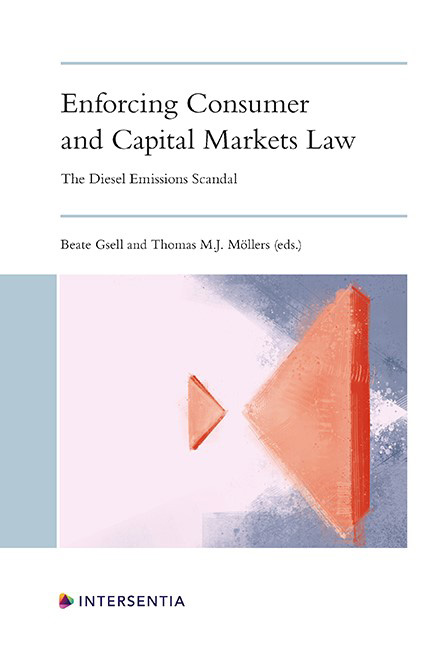Book contents
- Frontmatter
- Acknowledgement
- Contents
- List of Cases
- List of Abbreviations
- List of Contributors
- PART I INTRODUCTION
- PART II EUROPE
- PART II BEYOND EUROPE
- PART III THE SUPRANATIONAL PERSPECTIVE
- PART IV LEGAL PRACTICE PERSPECTIVE
- PART V INTRADISCIPLINARY ANALYSIS AND REFORM RECOMMENDATIONS
- Key Source Bibliography
- Index
- About the Editors
Practitioner Comment on Consumer Law Enforcement in Europe
Published online by Cambridge University Press: 22 December 2020
- Frontmatter
- Acknowledgement
- Contents
- List of Cases
- List of Abbreviations
- List of Contributors
- PART I INTRODUCTION
- PART II EUROPE
- PART II BEYOND EUROPE
- PART III THE SUPRANATIONAL PERSPECTIVE
- PART IV LEGAL PRACTICE PERSPECTIVE
- PART V INTRADISCIPLINARY ANALYSIS AND REFORM RECOMMENDATIONS
- Key Source Bibliography
- Index
- About the Editors
Summary
The VW emission scandal has demonstrated deficits in the enforcement of European consumer rights in practice. While VW customers in other parts of the world, in particular the US, have been compensated within a relatively short time after it became public that Volkswagen AG (VW) had installed illegal defeat devices in 11 million vehicles worldwide, including 8 million vehicles in Europe, many of the affected European consumers are still waiting for redress.
The initial setup in the VW emission scandal is exemplary for big mass tort cases worldwide: On the one hand there is VW, a multinational corporation, the largest car manufacturer in the world. On the other hand, millions of deceived consumers. It is in the nature of things that there is no level playing field (Section I.). While there are mechanisms to even the playing field between corporations and consumers, the legal system in Europe perpetuates the disadvantages of consumers (Section II.). The consequence is that many European consumers refrain from enforcing their rights (Section III.). To overcome this so-called ‘rational disinterest’ in the VW emission scandal in Europe, claim bundling models have emerged in praxis and the legislator has started to act (Section IV.). As long as there is no real group litigation mechanism for redress, stipulated on a European level, however, consumers in Europe remain in a disadvantaged position.
THE INITIAL SETUP: NO LEVEL PLAYING FIELD
The initial setup in the VW emission scandal is the typical constellation ‘repeat player versus one shotter’ which the American law professor Marc Galanter had already described in the year 1974. He characterised the repeat player as ‘a unit which has had and anticipates repeated litigation, which has low stakes in the outcome of any one case, and which has the resources to pursue its long-run interests’. The one shotter, on the other hand, ‘a unit whose claims are too large (relative to his size) or too small (relative to the cost of remedies) to be managed routinely and rationally’, deals with the legal system only rarely.
The structural predominance of the repeat player VW over the deceived consumers, each on his or her own a one shotter, is self-evident. The repeat player has numerous advantages from the outset: advance intelligence, expertise and access to specialists.
- Type
- Chapter
- Information
- Enforcing Consumer and Capital Markets LawThe Diesel Emissions Scandal, pp. 427 - 438Publisher: IntersentiaPrint publication year: 2020

